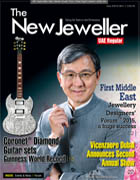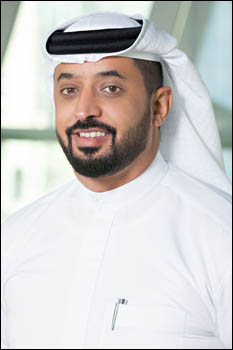


|
 |
| Home Technology / Education Events & News Archives Designs e - NewsLetter |
|
UAE committed to engaging with Civil Society as the KP Chair for Year 2016 Excerpts from Mr Ahmed Bin Sulayem’s maiden address as the KP chair
 Ahmed Bin Sulayem, Executive Chairman of DMCC What a very special four days we have had here in Angola. It has been a real honour to be here, seeing old friends and meeting new ones; attending the various discussions, panels, working groups and the social functions. It is also a privilege to be addressing you all as Chair of the Kimberley Process. Angola has done an incredible job over the past year and I would like to take this moment in thanking you,Bernardo Campos, for your achievements. We look forward to having you all visit the UAE next year to attend the intercessional and plenary conference. The KPCS was implemented in the UAE in 2003 making the UAE the first Arab country to do so. Since then, the Dubai diamond trade, under the support of the Dubai Diamond Exchange, has grown at a significant rate and positioned the Emirate as one of the leading diamond trading hubs globally. The UAE will use the opportunity as Kimberley Process chair to focus on three areas that will support the development of the diamond industry: To work together on the growth and reach of the KP while consolidating the achievements of the past 12 years – bringing to an end the flow of conflict diamonds globally; To strengthen the ties between the three pillars of KP through active engagement and collaboration; To assist newly admitted countries, and those that aspire to join the KP, with technical assistance, training and consensus-building through seminars and conferences. As we focus on these three topics,I am delighted that you will be joining us in the UAE. 2016 will be a unique opportunity for all KP participants to get first-hand experience of UAE’s and Dubai’s infrastructure and trading community, which have supported its growth in the industry. I am certain you have all heard about Dubai, andmany of you have been there. Nevertheless, I’d like to give you a glimpse of our Emirate. Dubai, which is the second largest city in the UAE, is at the heart of the ‘new silk’ route. Uniquely located between producing and consuming countries from West to East and North to South, Dubai has been known since ancient times as the "City of Trade”. Silks, spices, gold and pearls were all traded through Dubai from the 7th century before anyone coined the phrase globalisation. Our ancient commercial spirit remains, as Dubai seeks new opportunity, always looking beyond the horizon. Today, within an 8 hour flight radius, Dubai reaches over 4.9 billion people and approximately 65% of the global GDP. Between 1975 and 2008 Dubai was the fastest-growing economy in the world. In the same period, US’ GDP tripled, Hong Kong grew by a factor of 7, Singapore by a factor of 10 and Dubai by a factor of 11. Our economy remains strong, with a robust GDP growth at 4.5 per cent in 2014. This is why UAE today ranks first in the GCC and the rest of the Arab countries in attractingforeign direct investment. This is also why Dubai ranks one of the top five fastest growing cities in the world, according to a recent report that examined 300 cities. Our airport is the world’s busiest, with 69.9million international passengers last year. There are 6000 weekly flights to 210 destinations. Last year, Dubai attracted 13.2 million overnight visitors, and is on track to reach 20 million by 2020. Over 200 nationalities have come to make Dubai their home. But Dubai and the UAE is much more than buildings, tourism and airport. It has been recklessly said in this plenary session by members of civil society that the UAE is an ‘ethics-free’ society. This statement is irresponsible and fundamentally wrong. Let me give you some insight. It is deeply rooted in our belief as an Arab and Muslim nation, that it is our primary duty to help those in need, and make the world a better place. In 2013, the United Arab Emirates was crowned as the world’s top humanitarian donor offering 5.89 billion US dollars in foreign aid that year, reaching needing communities in more than 140 countries. That is almost double of the target set out by United Nations for donor countries. We are the number one global donor to development projects in the world last year. These achievementswere only made possible thanks to governmental and non-governmental bodies dedicated to alleviating suffering and promoting development around the world. In Africa alone, the UAE has invested more than $5 billion in infrastructure projects across the continent. We are also home to the International Humanitarian City (IHC), a Dubai-based logistics centre which hosts more than 50 non-governmental organisations, among them the Red Cross and Red Crescent Societies, who are all involved in the delivery of aid during crises and for long-term development purposes. UAE also pledged $120 million to support polio eradication efforts, working in partnership with the Bill & Melinda Gates foundation to promote distribution of vaccines. The result to date in Pakistan has been 86.6 million vaccination across Pakistan, reaching nearly 20 million children. I would like to quote His Highness Sheikh Mohammed Bin Rashid Al Maktoum, the Vice President and the Prime Minister of the UAE and the Ruler of the Emirate of Dubai: “Our aid has humanitarian objectives only; it is never governed by politics or limited by the geography, race, colour, or religion of the beneficiary.” We are alsoa nation of equals. The international community has recognized the UAE's commitment to advancing women's rights in the region and across the globe. In fact, the UAE leads the Middle East and North Africa in gender equality, ranking highest out of the region in the World Economic Forum's 2013 Global Gender Gap Report. Two days ago, Dr Amal al Qubaisi was elected as Speaker of the Federal National Council. This is her third term now at the FNC. Last but not least, we are a promoter of peace. The UAE military was one of the first countries to support the United States in the 1990 Gulf War. They later joined the collation forces in Afghanistan undertaking full scale operations for over ten years. Likewise, our military is committed to fighting ISIS, and our military is actively working to stabilize the situation in Yemen. With all this in mind, we were disappointed to learn that the Kimberley Process Civil Society Coalition has taken the misguided decision to boycott the UAE’s Chairmanship of the Kimberley Process in 2016 – the very first year an Arab country is chair. I want to make this point very clear: We remain committed to engaging with Civil Society, one of the three founding pillars of the Kimberley Process. We do not think that a boycott helps the KP or our industry. Dialogue does. Our door remains open to any civil society and industry organisation alike who are in a position to contribute fairly and transparently to discussions on the Kimberley Process and to work together on improving the future for the diamond sector. Before I close, I must say that it is a shame there was nobody here to give a state of the industry address. We should all be concerned. This is notthe time for any party of the KP to walk away from the table. We cannot predict the course of change but we can all get together to offer a route to a better future. For example, De Beersrough diamond sales in the second half of 2015 are their lowest in 30 years. According to industry sources, demand for rough is so low that even De Beers has declined to purchase diamonds from its Debswana joint ventureand The Botswana’s governments own auction sales were cancelled. Banks are withdrawing from the industry. African countrieswill be the primary losers in this industry shake-out. Back home, our diamond center (the Dubai Diamond Exchange) has been successful over the years because it serves the needs of producing countries and of producers. It facilitates trade and has supported our transformation from a fragmented industry, working mostly in informal markets; to consolidationand the rise of an industry with large, transparent, regulatory, financially compliant companies. Today, the world’s largest diamond companies are headquartered in Dubai. All the enormous progress that the industry has seen in the past decade, would not have taken place without Dubai and the UAE. Are we perfect? No, of course not. We are still on a road that was started just some ten years ago. But we know the diamond industry very well. We realize that in 2016 the investments made in the past decade will pay off. Dubai is at the moment the only location in the diamond world where banks are willing to enter into rough diamond financing. It is the only place which has available liquidity to help the diamond industry get through its difficult period. The KP protects and projects core values of responsible governance in a diamond world in which diverse players enjoy the fruits of individual economic freedom and free markets. As KP Chair, we will carry on with our mandate and focus on areas that will have the greatest impact on growth and development of the diamond industry. I continue to believe that we ALL have a shared interest in the KP; all stakeholders. Of course, we will have differences and cooperation will be accompanied by sacrifice. In the end, we need to rediscover what brought us here in the first place! 12 years later, it is time to acknowledge what we have accomplished, but also look at our weaknesses. That is why we propose to host a new Interlaken type of meeting in Dubai with ministerial decision makers from diamond producing and trading countries. From January 1st, we will take concrete steps in moving this forward. I would like to close, by thanking you all for your time, and once again, thanking Angola for their wonderful hospitality and share with you a brief video about Dubai. |